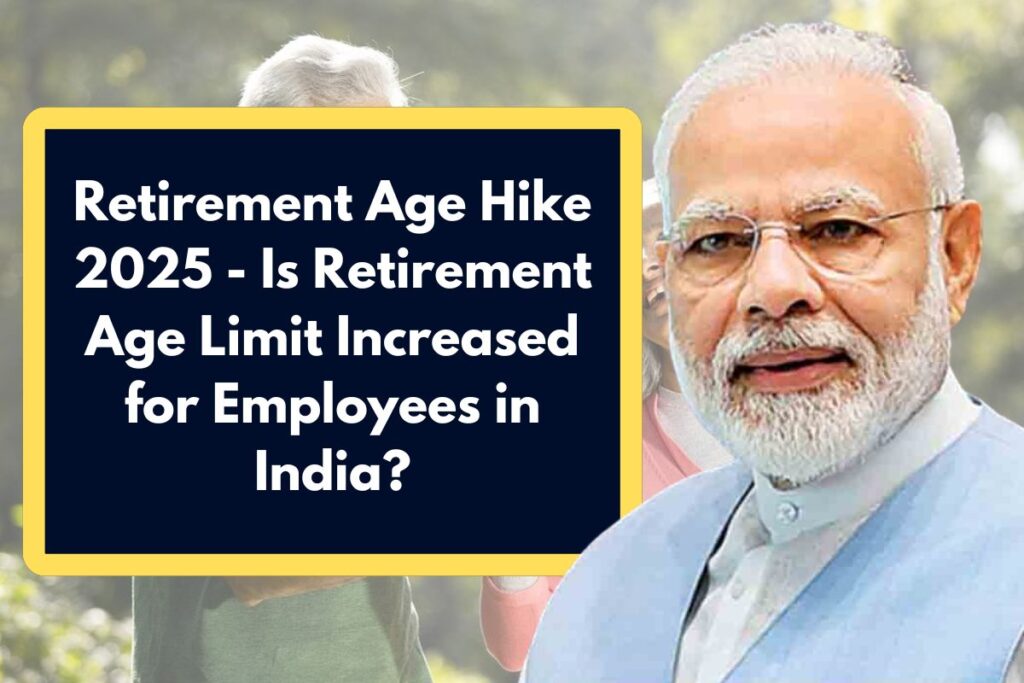Government authorities confirmed that no change has been made to the retirement age for central government employees, despite widespread social media rumours to the contrary. The Lok Sabha and the Press Information Bureau (PIB) have confirmed that no plan to raise the retirement age over 60 is under consideration.
People nowadays are healthier and live longer because to better healthcare services, which is the main justification for hiking the retirement age. Many employees who are 60 years old however possess the mental and physical capacity to work. Their expertise and experience can help younger employees through mentorship and seamless responsibility transfers if they are allowed to remain in their positions for an additional five years.
Retirement Age Hike 2025
Social media is buzzing with posts stating that GOI has approved Retirement Age Hike 2025 of central government employees to 62. The central government has not changed the retirement age for its employees, the PIB stated, and the widely shared post was a hoax. The official statement of GOI is still that no such plans are under consideration and GOI underlined that any assessments pertaining to retirement are not intended to change retirement regulations, but rather are a component of initiatives to increase public sector efficiency.
Planning for one’s career and finances requires an understanding of India’s retirement age policies. The retirement age has not been raised by the central government, although shifting labour patterns are indicated by changes to state laws and private sector restrictions. Additionally, there may be a trend towards longer work tenures when comparing India’s retirement age to international norms. Employees may successfully manage these changes by keeping up to date, making financial plans, and seeking advice from specialists.
Understanding the Retirement Age Hike
An important change in employment laws is represented by the decision to raise the retirement age for government employees. The Supreme Court’s decision eliminates the 60-year-old obligatory retirement age, allowing employees to continue working in accordance with their performance and abilities. Employees of the central government and state governments are expected to be impacted by the decision, which will provide them with the chance to stay employed, maintain their financial security, and make a significant contribution to their respective fields.
In several places of France, the change in the retirement age has caused controversy. However, the governments of a number of nations see the reasoning behind this choice and are taking it into consideration for their own nations as well. Businesses and the government may gain from it, even if it would require individuals to work longer hours and get delayed retirement benefits.

Government Denies Retirement Age Increase- Fact Check
The age of retirement for central government employees has not been raised to 62 by the Indian government as GOI via PIB stated that, it has not decided to hike the retirement age for government employees. Additionally, the government confirmed in the Lok Sabha that no proposal to hike the retirement age of government employees is under consideration as of now. Therefore, the claim in the post is untrue.
Retirement Age In India
At 58–60 years old, India now has the lowest retirement age in the world. The Kerala government issued an ordinance raising the state retirement age to 60 in October 2020. It was extended to all state government agencies. Different states have the authority to determine the retirement age for government employees as it is a state-specific matter.
It must, however, follow the rules established by the Central Government. It seems likely that the Indian government would follow France’s lead, despite the Central Government’s lack of confirmation. A few of states have already raised their employees’ retirement age to 62.
Will 62 become the new retirement age?
India’s plan to raise the retirement age to 62 is still up in the air. However, given the available data, it could be an essential step. India has the lowest retirement age in world. From 61.7 in 1998 to 70.1 in 2020, the residents’ life expectancy has similarly grown. This implies that aside from their pension and other retirement benefits, a retired person most likely will not have a steady source of income for nearly ten years in their later years. A person can also accumulate a larger EPF corpus when they retire by raising their retirement age.
Retirement Age Hike 2025 Benefits for Employees
- Job Security: Employees will have extra years to work, make money, and save savings for their post-retirement years.
- Improved Financial Planning: Employees who postpone retirement will have more time to accumulate savings, which lessens their financial burden in retirement.
- Reduced Recruitment Costs: Rather of holding massive recruiting drives all at once, the government may save money by distributing recruitment efforts over a longer time frame.
- Easier Workforce Transition: Experience and skills can be transferred over time when seasoned personnel mentor younger ones.
| Homepage | KeralaCoBank.Com |
Samarth Choudhary is a Chief Editor at keralacobank.com. He has overall editorial experience of 10 years in online media. He has completed his graduation from University of California and masters in Finance from University of Dallas in year 2010. His major interest and expertise is in Finance, Taxes, Government Aid and Schemes. His Major focus is to help users to get relevant information which are published on keralacobank.com in easy and precise form.

